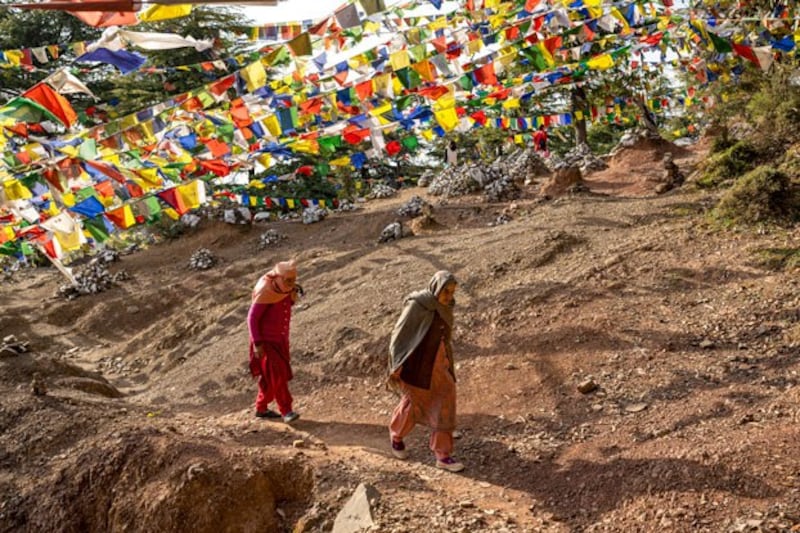For the first time, Chinese authorities are forcing ordinary Tibetans to remove religious symbols and destroy such structures from the exteriors and roofs of their homes in several villages in a Tibetan area of Sichuan province, two sources with knowledge of the situation said.
Authorities also are prohibiting Tibetans in Sichuan province and elsewhere from organizing and participating in prayer sessions online, said the sources who requested anonymity for fear of reprisal.
The measures come as Beijing intensifies efforts to assimilate Tibetans and adapt Tibetan Buddhism so that its tenets and practices conform with the ideology of China’s Communist Party.
While authorities have demolished religious objects and structures at times at Buddhist monasteries in Tibet, this is the first instance of religious symbols at ordinary people’s homes being destroyed.
RELATED STORIES
[ Report offers fresh examples of destruction of religious sites in eastern TibetOpens in new window ]
[ Chinese government destroys third Tibetan Buddhist statue in 3 monthsOpens in new window ]
[ China destroys second revered Tibetan statue in SichuanOpens in new window ]
[ Tibetan monks, local residents forced to watch destruction of sacred statueOpens in new window ]
Since the beginning of July, Chinese authorities have conducted searches of all homes in at least four villages in Ngaba county, said the sources, one of whom lives in exile and the other who is inside Tibet.
They are forcing Tibetans to remove prayer flags hoisted on rooftops and to destroy religious objects, said the source from inside Tibet.
Among the objects being dismantled are concrete structures resembling chimneys outside homes where Tibetans perform Sang-sol, or incense offerings, to mark important religious and personal events in their lives, he said.
While authorities have not publicly disclosed the reason for their actions, Tibetans expect similar inspections in neighboring Tibetan areas, both sources said.
No online prayer sessions
Tibetans in Sichuan province and elsewhere are also prohibited from organizing any religious prayer sessions online in their social media messaging groups or chat groups, one of the sources said.
“Individuals who have initiated these prayer sessions have been summoned for interrogations by Chinese authorities,” he said.

China has continued to restrict and control Tibetan religious practices and shown no willingness to resume formal negotiations about greater autonomy for the region with representatives of the Dalai Lama, the spiritual leader of Tibetan Buddhism, according to the most recent annual report by the U.S. Congressional-Executive Commission on China.
Beijing also bans Tibetans from observing significant cultural, religious and historical events such as Tibetan National Uprising Day and the Dalai Lama’s birthday.
But Tibetans have defied these prohibitions, despite possible severe consequences.
During the Dalai Lama’s birthday on July 6, monks from monasteries in the Ngaba area were confined to their compounds under police presence to enforce such restrictions, said the first source from inside Tibet.
With the birthday of Kirti Rinpoche, the head of Ngaba’s Kirti Monastery, approaching in August, Chinese authorities have already implemented online restrictions and threatened Tibetans against posting any photos or well wishes, said the second source.
In March, Chinese police arrested Pema, a Tibetan monk from Kirti Monastery for staging a solo protest while holding a portrait of the Dalai Lama on the streets of Ngaba county.
Pema, who was working as a teacher for the preliminary Buddhist study section at the monastery, also shouted slogans against Chinese policies in Tibet during his protest and was immediately arrested.
Translated by Tenzin Dickyi and edited by Tenzin Pema for RFA Tibetan. Edited by Roseanne Gerin and Matt Reed.
